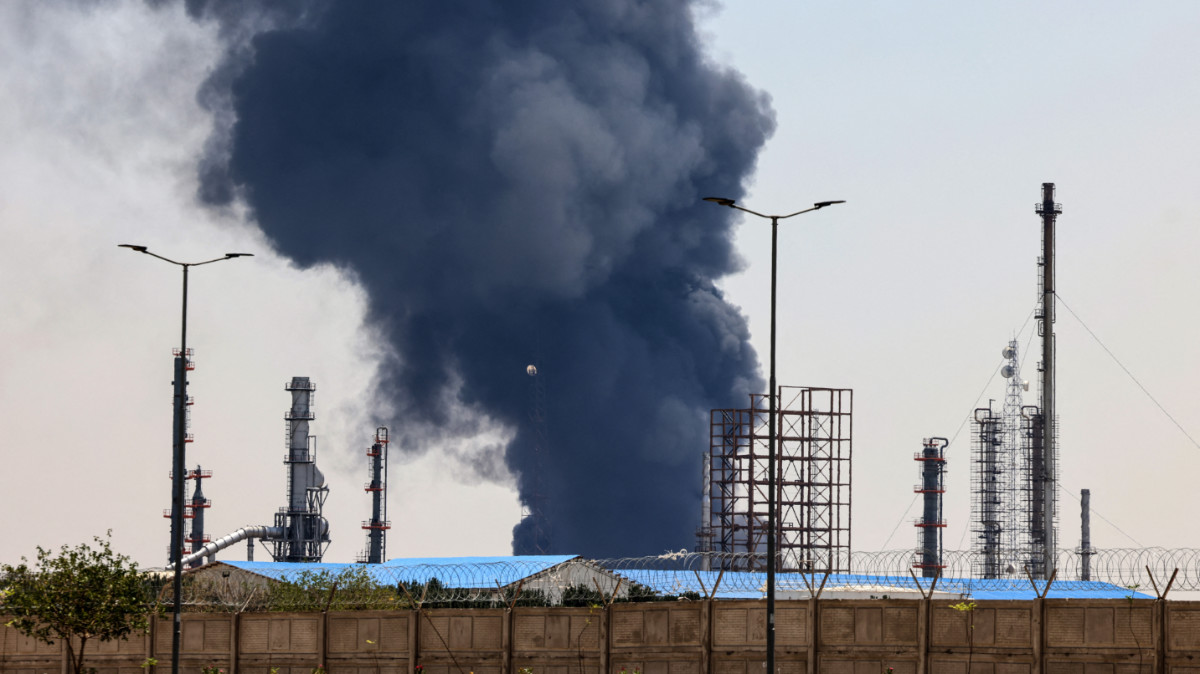Iran would have to risk it all to count on an oil price shock ending the war

A war between Israel and the Islamic Republic of Iran has always been the big black swan event for oil markets that energy-rich Gulf states and opportunistic western traders were on the lookout for.
So far, it has been a disappointment.
Although oil prices shot up around 10 percent after Israel’s attack on Iran on Friday, they have cooled substantially despite the images of burning oil facilities in Iran and Israel.
The international benchmark Brent was trading up 3.38 percent on Monday, at $71.84 per barrel. Before Israel’s Friday morning attack on Iran, Brent was trading at roughly $69 per barrel.
The main factor keeping prices subdued is that Iran has not bombed oil-rich countries in the Arabian Gulf or followed through on its threat to shut down the Strait of Hormuz, the narrow waterway separating Iran from the Gulf states through which a third of the world’s seaborne oil passes.
New MEE newsletter: Jerusalem Dispatch
Sign up to get the latest insights and analysis on Israel-Palestine, alongside Turkey Unpacked and other MEE newsletters
To be sure, Israel and Iran have pounded each other's energy infrastructure.
Israel attacked two gas processing facilities on Iran’s south coast over the weekend. The facilities process gas from South Pars, the world’s largest natural gas field, which Iran shares with Qatar. But the facilities are mainly for domestic use. Israel also bombed Iranian oil depots in Tehran.
Iran has responded by attacking the Bazan oil refinery complex in Haifa, Israel, sparking large blazes.
But experts say the attacks have been carefully calibrated on both sides to avoid big supply disruptions.
“At this stage, there is very limited to no impact on oil outputs and exports, so the rally largely reflects a rising risk premium to account for…potential disruptions,” Citibank analysts wrote on Monday.
'Iran prefers not to hit Arab Gulf'
Despite the blazes in Israel and Iran, Citibank has maintained its long-term forecast for oil to be at $60-65 per barrel.
Iran faces a strategic dilemma, Greg Priddy, an energy expert at the Center for the National Interest, told Middle East Eye.
“Iran seems to be trying to find a way back to the negotiating table with Trump,” Priddy said. “They would also prefer not to have to hit Arab countries,” he added.
On the one hand, bombing the Gulf or closing the Strait of Hormuz may be the type of event that inflicts serious pain on American and European consumers because of higher energy prices. That could make Israel's attacks more unpopular.
But that could also antagonise the very Gulf states that Iran hopes will lobby the US to rein in Israel.
Iran is less isolated amid Israel’s attacks today than it was in 2018, when US President Donald Trump unilaterally withdrew from the 2015 nuclear deal. This is because Tehran and Gulf monarchies like Saudi Arabia and the United Arab Emirates painstakingly worked on a delicate rapprochement after fighting proxy wars for years in Yemen and Syria.
The Gulf states have condemned Israel's attacks on Iran and have attempted to distance themselves from any military intervention.
Reuters reported on Monday that Iran had asked Saudi Arabia, Oman and Qatar to press the Trump administration for a ceasefire with the Israelis.
If Iran attacks Saudi oil facilities or closes the Strait of Hormuz with mines, it could invite a direct US military attack with the Gulf's tacit support.
Arab officials are already concerned that the likelihood of the US bombing Tehran is increasing, MEE reported on Monday.
Iran knows from history that weaponising the Strait of Hormuz would invite a US response. During the Iran-Iraq war in the 1980s, the US Navy intervened to protect Kuwaiti oil tankers and engaged in direct conflict with Iran after it mined the area.
Iran also relies on the strait to send its oil to China, its top customer. Even Israel has refrained from attacking Iranian tankers.
How Saudi Arabia and Opec hurt Iran's energy leverage
But the big problem for Iran, if it is counting on an energy shock, is that there is just too much oil on the market. Any action that it does take would have to be very large, experts say.
The energy alliance Opec+, which is led by Saudi Arabia and Russia, opened the taps in the lead-up to Israel’s attack on Iran.
The decision to increase production surprised many because it represented a break for Saudi Arabia, which for three years lobbied Opec+ to keep production tight, in a bid to boost prices.
Experts at the time said that Saudi Arabia pivoted to supporting big production increases to punish countries like Kazakhstan and Iraq, which were "cheating" on their Opec+ quotas, in addition to pleasing US President Donald Trump as he tried to tame inflation.
The decision has been incredibly convenient for the Trump administration, as Israel and Iran trade blows.
For example, in the US, a gallon of regular gasoline costs $3.14 on average, down from $3.45 at the same time last year, according to the AAA motor club.
The worst-case scenario that Priddy described to MEE would be an attack on the massive Abqaiq refinery in eastern Saudi Arabia, combined with “chaos in the Strait [of Hormuz]”.
“That could end up with crude in the upper $100’s per barrel and cause a recession,” he said.
But even then, such war shocks often prove to be short-lived. After Russia invaded Ukraine in February 2022, crude shot up by 30 percent above $120 per barrel, only to drop down to pre-invasion levels two months later.
Unless it's willing to risk it all, Iran may not be able to count on an oil price shock.
middleeasteye.net